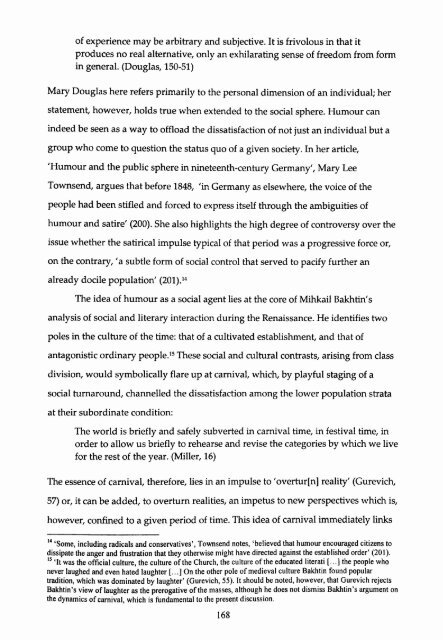HERMANN HESSE AND THE DIALECTICS OF TIME Salvatore C. P. ...
HERMANN HESSE AND THE DIALECTICS OF TIME Salvatore C. P. ...
HERMANN HESSE AND THE DIALECTICS OF TIME Salvatore C. P. ...
Create successful ePaper yourself
Turn your PDF publications into a flip-book with our unique Google optimized e-Paper software.
of experience may be arbitrary and subjective. It is frivolous in that it<br />
produces no real alternative, only an exhilarating sense of freedom from form<br />
in general. (Douglas, 150-51)<br />
Mary Douglas here refers primarily to the personal dimension of an individual; her<br />
statement, however, holds true when extended to the social sphere. Humour can<br />
indeed be seen as a way to offload the dissatisfaction of not just an individual but a<br />
group who come to question the status quo of a given society. In her article,<br />
'Humour and the public sphere in nineteenth-century Germany', Mary Lee<br />
Townsend, argues that before 1848, 'in Germany as elsewhere, the voice of the<br />
people had been stifled and forced to express itself through the ambiguities of<br />
humour and satire7 (200). She also highlights the high degree of controversy over the<br />
issue whether the satirical impulse typical of that period was a progressive force or,<br />
on the contrary, 'a subtle form of social control that served to pacify further an<br />
already docile population' (201). 14<br />
The idea of humour as a social agent lies at the core of Mihkail Bakhtin's<br />
analysis of social and literary interaction during the Renaissance. He identifies two<br />
poles in the culture of the time: that of a cultivated establishment, and that of<br />
antagonistic ordinary people. 15 These social and cultural contrasts, arising from class<br />
division, would symbolically flare up at carnival, which, by playful staging of a<br />
social turnaround, channelled the dissatisfaction among the lower population strata<br />
at their subordinate condition:<br />
The world is briefly and safely subverted in carnival time, in festival time, in<br />
order to allow us briefly to rehearse and revise the categories by which we live<br />
for the rest of the year. (Miller, 16)<br />
The essence of carnival, therefore, lies in an impulse to 'overturn] reality' (Gurevich,<br />
57) or, it can be added, to overturn realities, an impetus to new perspectives which is,<br />
however, confined to a given period of time. This idea of carnival immediately links<br />
14 'Some, including radicals and conservatives', Townsend notes, 'believed that humour encouraged citizens to<br />
dissipate the anger and frustration that they otherwise might have directed against the established order' (201).<br />
15 'It was the official culture, the culture of the Church, the culture of the educated literati [...] the people who<br />
never laughed and even hated laughter [...] On the other pole of medieval culture Bakhtin found popular<br />
tradition, which was dominated by laughter' (Gurevich, 55). It should be noted, however, that Gurevich rejects<br />
Bakhtin's view of laughter as the prerogative of the masses, although he does not dismiss Bakhtin's argument on<br />
the dynamics of carnival, which is fundamental to the present discussion.<br />
168
















